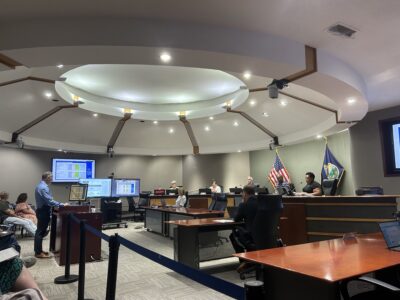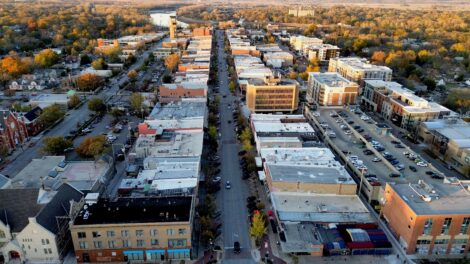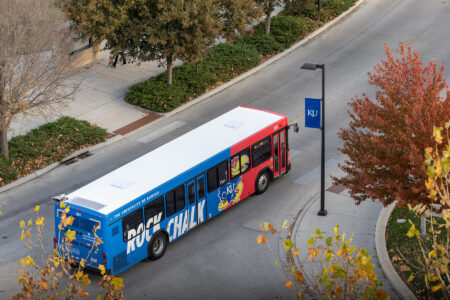Lawrence city commissioners vote to increase guest tax on hotel stays ahead of 2026 World Cup
They plan to review the rate in 3 years

photo by: Bremen Keasey
Parks, Recreation and Culture director Luis Ruiz giving a presentation to the Lawrence City Commissioners about raising the Transient Guest Tax on Aug. 19. Commissioners voted 4-1 to raise the TGT from 6% to 8% ahead of the 2026 FIFA World Cup.
City commissioners voted Tuesday night to increase the guest tax on hotel or short-term overnight stays in Lawrence by 2 percentage points to capitalize on an increase in visitors expected next summer for the 2026 FIFA World Cup.
The commission voted 4-1 to increase the transient guest tax from 6% to 8%. The item needed a supermajority of at least four commissioners to pass; Commissioner Amber Sellers was the lone no vote.
The transient guest tax provides revenue to fund tourism-related initiatives, but Luis Ruiz, the director for the city’s Parks, Recreation and Culture department, told commissioners the transient guest tax fund was currently “structurally imbalanced.” In a presentation to the commission, he said that if the tax weren’t increased ahead of 2026, the fund would be operating in a deficit by 2027.
At an increased rate of 8%, however, the city projected that the guest tax fund would receive just under $940,000 in additional tax money and grow its balance.
Part of that growth would come from hundreds of thousands of visitors coming to the Kansas City region for the 2026 World Cup. Six matches will be held in the KC area between June 16 and July 11, including a quarterfinal contest, and there is a possibility that Lawrence could be selected as a base camp for one of the 48 national teams. It’s estimated that 600,000 visitors will visit the region during the World Cup.
Ruiz also said that Lawrence’s guest tax was lower than those of other cities in the region. Cities such as Overland Park and Mission have a guest tax of 9%, while Shawnee, Merriam, Lenexa, Leawood and Kansas City, Kansas, all are at 8% — and Ruiz said Kansas City, Kansas, was moving to increase its rate during the World Cup to 10%.
“This is an opportunity to grow without going outside the boundaries of what is common in the marketplace,” Ruiz said.
Ruiz said that many city leaders have been working with leaders across the region since last October on how Lawrence could capitalize on the increase in visitors from the World Cup, but that there were no funds allocated to help programs aimed at increasing tourism. Ruiz said raising the guest tax could provide “fuel” to execute the plans.
Commissioner Lisa Larsen asked Ruiz how the guest tax fund got out of balance in the first place. Ruiz said some projections in previous budgets were too high, and that when the fund had a larger balance, some of the money was used for things that weren’t as related to increasing tourism. Larsen asked Ruiz how the city would make sure that this doesn’t happen again; Ruiz said the city would work to ensure that the guest tax dollars went to programs that generated revenue and provided a good return on investment. He said the last large-scale review of how the guest tax money was spent — and what return the city got on it — probably happened in 2010, the last time the tax was raised.
Several people in the hotel industry in Lawrence spoke during the public comment period, calling for more transparency about how the guest tax funds are allocated. Kim Anspach, the executive director for Explore Lawrence, said more transparency around the guest tax would build trust.
Anspach said tourism is “one of Lawrence’s strongest economic engines,” bringing nearly $300 million into the Lawrence economy in the past year. She said the World Cup is a “once-in-a-lifetime opportunity” for the city in the short term that can set up the city’s tourism sector for the long term. And she said it was equally important to put the guest tax fund in a good position so “it can continue to attract visitors and grow the local economy.”
Sellers asked whether it would be possible to raise the guest tax only on short-term rental units such as Airbnb properties. Randy Larkin, the deputy city attorney, and Rachelle Matthews, the city’s finance director, said it would likely be more difficult to make that a possibility. Anspach said that out of the $2.2 million in guest tax money the city collected last year, about $300,000 came from those types of units.
Sellers also felt it would be better to first increase the guest tax to 7.5% instead of 8%, partly because Ruiz said a rate of 7.5% would still get the guest tax fund out of its deficit. Although the rest of the commissioners said they were happy with increasing the tax to 8%, they agreed to another suggestion from Sellers to add in language to re-evaluate the rate in three years.
In other business:
• Commissioners approved on final reading multiple items to create financial incentives for KU’s Gateway project.
As the Journal-World reported, the commission approved on Aug. 12 a major package of financial incentives worth around $94.6 million for the second phase of the project, which would build a hotel that connects to the conference center, new parking, new student housing and space for businesses. Those incentives included creating multiple new taxing districts and entering a development agreement with the university.
The second reading for these items was initially on the commissioners’ consent agenda for Tuesday, which is usually approved with one vote, but Sellers asked to pull the items for a separate discussion and vote.
The items that the commissioners adopted on second and final reading will create new taxing districts — a Tax Increment Financing district and a STAR Bond district — and allow a special sales tax area on campus. The first two items needed a supermajority to pass, and they were approved 5-0 and 4-1, respectively. Sellers was the lone no vote. The special sales tax area passed 3-2, with Sellers and Larsen voting no.
• Commissioners approved a rezoning request that will allow a 33-unit apartment complex to be built on a vacant lot on McDonald Drive.
As part of its consent agenda, the commission unanimously approved the request to rezone 1.32 acres of land at 515 McDonald Drive from a mixed-use district to a high-density residential district. The Planning Commission voted 6-2 in July to recommend the rezoning, as the Journal-World reported, citing the need for more housing in Lawrence.
As the Journal-World reported, longtime Lawrence developer Doug Compton and Lawrence-based Adams Architects had filed plans for a two-building apartment complex on the 1.32-acre site, which once housed a hotel until that building was destroyed by a fire in 2018.





